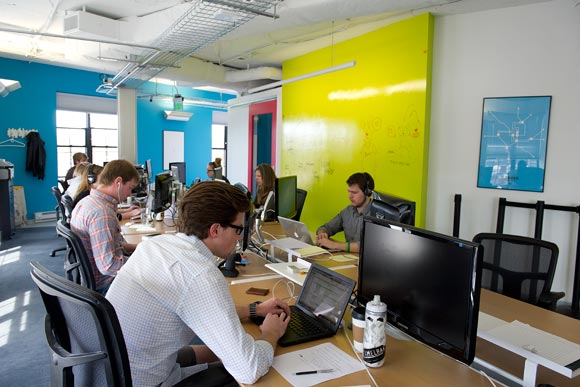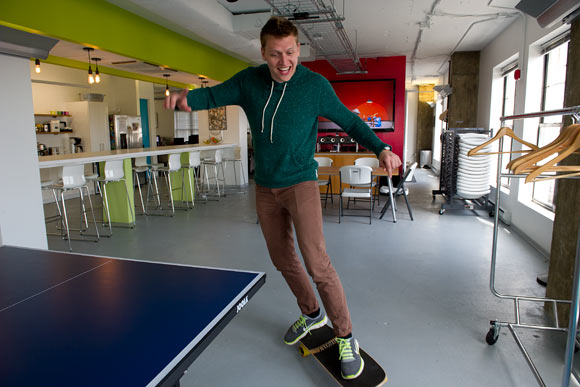A little over two years ago, the first
D.C. Tech meetup took place with a handful of participants. Recent meetups have been standing room only, with nearly a thousand participants crowding into Sixth and I synagogue to see and hear the latest news from the tech scene. In short, D.C.'s start-up scene in on fire.
But what is the next step? What's the relationship between the tech industry and the city itself? These questions and more will be answered, or at least discussed, at Tech in the City, a panel discussion organized by
Smart Growth America, about the growth and needs of technology startups in the Washington, D.C., area.
"D.C. has done an amazing amount of work over the last ten years with neighborhoods that are supportive of start-ups," says Ilana Preuss, vice president and chief of staff at SGA, who will moderate. "There are lots of co-work spaces. So what else needs to happen? We're bringing together D.C. tech and city developers to ask that question."
"If you want to be deliberate and intentional about change, where do you start?"
"Cities are aware that the pace of change is accelerated," says Harriet Tregoning, director of the D.C. Office of Planning. "Having an entrepreneurial climate and having well-educated young people will make change more likely to happen. If you want to be deliberate and intentional about change, where do you start?"
It's about space
In a metro area where space is at a premium, co-working spaces are a must. Preuss cites low-cost office space, informal gathering places like coffee shops, and public transportation as key factors in the formation of a neighborhood that supports startups. "Any neighborhood in D.C. that has strong Metro access can be a start-up neighborhood," Preuss says. "Transit is key."
Preuss is hesitant to point to one specific area of D.C. as "the" tech neighborhood. She says that while she sees a cluster of tech companies around Connecticut Ave, "tech businesses are literally all over the map."
Peter Corbett, CEO of iStrategyLabs in Dupont Circle, doesn't see a single tech-focused neighborhood in D.C. either. "It's an arc of innovation," he explains. "It starts in Georgetown, continues through Dupont and U St., and ends in Chinatown. Typically you don't see tech start-ups on H St. or downtown, but you could argue [that point because of] 1776." (The 1776 campus is located downtown.)
Corbett muses on the creation of a "digital District." "It's hard to do," he says. "The whole district is digital. Where in D.C. would you put it? Show me a four-city block."

Corbett applauds D.C. Mayor Vincent Gray's recent venture to SxSWi to attract more start-ups to the District, but he questions a prevailing line of thought that would try to put those new businesses across the river or at St. Elizabeth's. "It's a different kind of technology," he says. "[Being in] St. E's is like being in Reston. It's irrelevant. People don't go there...it's not on the beaten path. When you're trying to build density, you want to take the path of least resistance."
Tregoning agrees that density is key. "That suggests concentration to some degree," she says, "but it doesn't preclude [having] several places in the city where you could have technology...clusters, perhaps around specific tech specialties."
It's about policy
In addition to physical space, Corbett and Tregoning cite intangible changes that both believe would further support the tech startups in the District.

Corbett says that of all the areas in the region, D.C. has the highest capital gains tax, at 9 percent. "Virginia is at 0 percent, Maryland is at 5.5 percent," he explains. "If you're going to incorporate a business or an angel fund, you're going to do it anywhere but D.C." A proposal to reduce the tax to 3 percent was voted down by the D.C. Council in September 2012.
Tregoning says that Gray is continuing to work on the capital gains tax issue, but also points to other changes that need to happen in the regulatory realm. "Our regulations are designed for large businesses," Tregoning explains, "not 'transactive' businesses, such as Airbnb or SideCar, that are designed for the new economy."
She's not kidding. A D.C. homeowner looking to rent out a spare bedroom or couch to travelers on Airbnb or Craigslist
needs a host of licenses and a business tax registration, or she could be fined $2,000 or more.
It's about working together
Whether change involves sharing offices, maximizing under-utilized spaces or rewriting regulations to better reflect businesses within the city limits, change can only happen when honest discussions happen and ideas are exchanged.
"Harriet understands the creative economy and how tech plays into that," Corbett says. "She has insight into how to shape a city for start-ups."
Tech has been driving the startup train for the past few years, but Corbett knows that tech isn't the only game in town. "Everyone is going to use technology in some way. How can the tech sector support other sectors of the economy?"
"The startup community has been leading the way [for change] by being mutually supportive and creating infrastructure," explains Preuss. "The city has an important role—to invest in healthy neighborhoods."
"The city has an important role�to invest in healthy neighborhoods."
"We love the government," Tregoning says, "but it's not good for any city to be a one-company town. Hopefully, with this panel, we'll meet new people and companies that are engaged in work to make change happen."
Tech in the City, on April 18, is one of four panel discussions organized by Smart Growth America and co-sponsored by Elevation DC. Join the wait-list here.